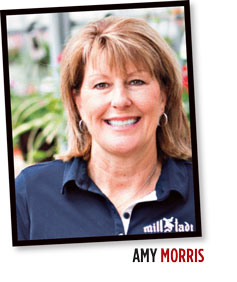6/1/2019
Who’s “Braking” Your Business?
Amy Morris

Every day, I walk the greenhouse and I look around and see where our company can be more efficient. We talk to our employees about clearing floors, not throwing away extra tags or plastics, and if we start clean, we can stay clean and try not to waste chemicals.
As growers and owners, we understand the ups and downs of our industry. We often have the deck stacked against us. We all know that Mother Nature isn’t always on our side when it comes to weather, but we do what we can to adjust to the rainy days. We need to work smarter to improve our bottom line. Margins are getting tighter every year, so we come up with new ways to reinvent ourselves to keep ahead of the curve. However, what do we do, as an industry, when the government mandates a new policy on trucking and doesn’t see the effect it has on our bottom line?
It’s been a year since the ELD (Electronic Logging Device) and HOS (hours of service) has fully been implemented. The freight situation affects both incoming material as well as shipments of finished product. We spent months planning the best strategies on how to receive the most cost-effective way and how to ship smart.
One of our company’s biggest problem is the lack of drivers. We’re seeing a large drop in driver applications. Sure, we’ve had trouble in the past trying to find drivers during the spring, but it’s always worked out. This year, there has been a huge void in our industry and in the U.S. On top of that, the wage increase to keep a driver has risen significantly and so has the price of fuel. So what do we do as an industry to protect our business?
I’ve recently been elected to AmericanHort’s Board of Directors and they’re currently lobbying to get us included in the agriculture exemption, primarily getting explicit inclusion for the horticulture industry.
Tal Coley, the Director of Government Affairs for AmericanHort, stated, “When it comes to government regulations, clear wording and definitions are a must to those who must comply with the rules. Such is the case with the Department of Transportation’s HOS and ELD regulations for the trucking industry implemented in late 2017. Inconsistencies and a lack of clarity in the regulations has led to confusion and higher costs for many small business owners and producers in the fields of agriculture and horticulture. That’s why industry leaders are asking Congress to clarify the rules, in order to provide greater flexibility and fairness for horticulture producers, distributors and shippers.”
Currently, there are some common-sense exemptions for agriculture transportation. Drivers moving commodities “for distances less than 150 miles or as the crow flies measure” would be exempt. Unfortunately, they excluded horticulture and nursery products. This is also causing much confusion for shippers that rely heavily on rapid movement of goods.
Tal shared with me, by any reasonable definition, these products should be classified as “agricultural commodities.” And, in fact, for most taxation and regulation purposes, they are. Yet strangely, horticulture and floriculture products weren’t included in the definition of “agricultural commodities” as exempted under the HOS and ELD mandates.
My association represents the horticulture industry, which is negatively affected by the confusion sown by the new regulations. Our industry is vast and includes the very businesses that American communities rely on—plant breeders, greenhouse and nursery crop farmers, distributors, retailers, landscape professionals, florists and more. We’re active in all 50 states, with annual sales estimated at $196 billion and almost two million full-time and part-time employees.
Congress has the opportunity to set the record straight by passing the Agricultural Trucking Relief Act of 2019, a bipartisan bill introduced in March by Rep. Austin Scott (R-Ga.). This bill would appropriately adjust the definition of “agricultural commodities” to include horticulture and nursery products. This will allow clarification of the mandate so that regulations and industry would be the same. Working with Congress is our best way to act to help fix what’s broken, and balancing the needs of agriculture and horticulture producers is a practical start.
If you would like more information on how to get involved, please join AmericanHort. If you’re already a member, visit their website (AmericanHort.org) and go to the Advocacy section. Our voices matter and need to be heard. GT
Information from Tal Coley was taken form RealClear Policy March 22, 2019.
Amy Morris is Vice President of N.G. Heimos Greenhouses in Millstadt, Illinois. She can be reached at Amorris@ngheimos.com.